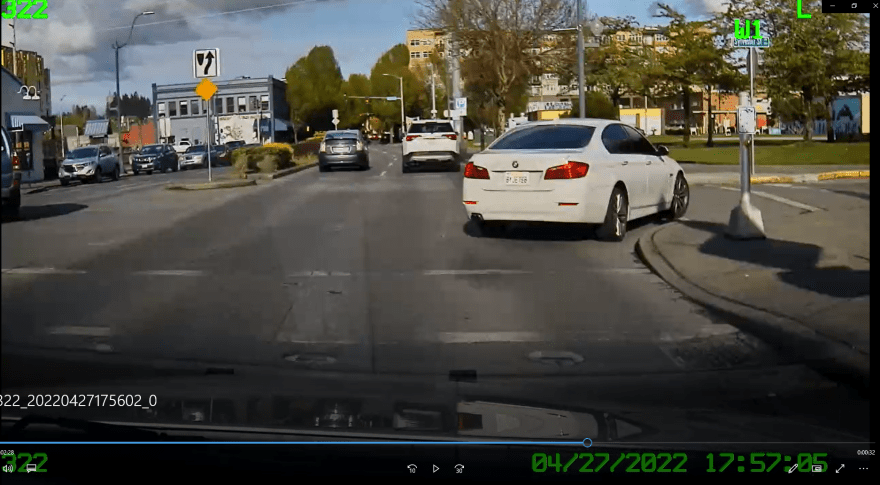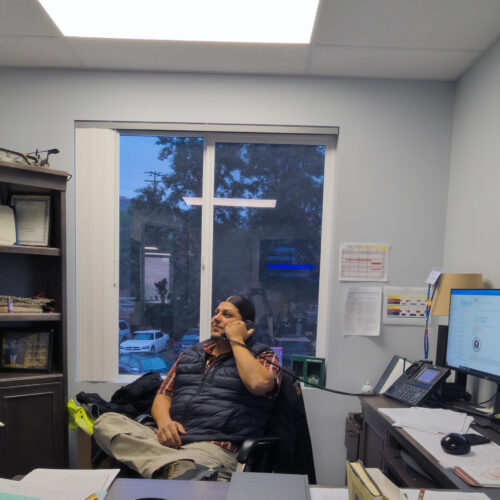It was just before 6 p.m. on a Wednesday evening last month when a state trooper spotted a white BMW with California license plates passing on a double yellow line along Deschutes Parkway near Washington’s Capitol. Dashcam video from that evening shows the trooper trying to catch up to the speeding car.
But when the trooper closed the gap with the BMW near the edge of downtown Olympia and turned on his flashing lights, the car didn’t pull over. Instead, the driver took off.
The video, obtained through a public records request, shows the car weaving in and out of lanes, taking a hard right turn, running a stop sign and then a red light and narrowly missing cars before racing off in the direction it had come. The trooper did not give chase.
The Washington State Patrol (WSP) says drivers refusing to stop for troopers is an increasingly common occurrence. From January 1 to May 17 of this year, the agency logged 934 failure-to-yield incidents. While the patrol didn’t track this in the past, veteran troopers say there’s been a dramatic uptick in drivers fleeing traffic stops.
“Something’s changed. People are not stopping right now,” said Sgt. Darren Wright, a WSP spokesperson with 31 years on the job. “It’s happening three to five times a shift on some nights and then a couple times a week on day shift.”
It’s not just the State Patrol that’s noticing the trend. So are local police departments. The Puyallup Police Department logged 148 instances of drivers fleeing from officers from July 26, 2021 to May 18, 2022.
Asked if that represents a significant increase, Chief Scott Engle wrote in an email, “I could 1,000,000% say this is completely absolutely emphatically totally unusual.”
In Lakewood, another small city in Pierce County, Chief Mike Zaro said drivers are refusing to stop for his officers on average once a day.
“A lot of times they’re stolen cars; sometimes we don’t know what the deal is,” Zaro said.
Steve Strachan, the executive director of the Washington Association of Sheriffs and Police Chiefs, said these are common stories he’s hearing from his members across the state.
“It used to be sort of unusual and notable to see someone flee or to see someone simply choose not to stop on a traffic stop. Now it’s becoming incredibly common,” Strachan said.
Strachan and others in law enforcement connect the increase in failures-to-yield to passage last year of House Bill 1054, a sweeping police tactics law that, among other things, barred high-speed pursuits except in very limited circumstances. The law was part of a package of police reforms majority Democrats passed in response to the murder of George Floyd in Minneapolis and other high-profile police killings — reforms aimed at addressing racial disproportionality in policing.
Minority Republicans in the Legislature criticized many of the changes, including the pursuit law, and said they jeopardized public safety.
Strachan said he doesn’t dispute the need for statewide rules governing police pursuits, but thinks the new law went too far.
“We have seen a significant change in the environment out there where the word is out … about this restriction,” Strachan said.
As an example, Strachan pointed to an incident in March in Redmond, Washington when a driver with a suspended license called 911 and cited House Bill 1054 to explain why they were refusing to stop for an officer who was behind them.
“I’m driving suspended, he’s not going to get me,” the driver said in a recording of the 911 call obtained from the Redmond police department. “It’s a violation of 1054. He’s not allowed to chase me. You need to tell them to call it off.”
Under the new law, police officers can’t give chase unless there’s reasonable suspicion to believe the driver is impaired or the higher standard of probable cause to believe they’re an escaped felon or have committed a violent crime or a sex crime. Even then there are restrictions on when officers can pursue. Officers must balance whether the person poses an “imminent threat” and whether the safety risks of the person getting away outweigh the danger of engaging in a high-speed chase.
This year both the Washington House and Senate passed a bill with bipartisan votes that would have amended the new pursuit law in response to concerns from police that it was too restrictive. But a final version of the measure died in the state Senate. Advocates for police reform opposed the change.
“Why is it we are so concerned about hot pursuits,” asked Martina Morris with the group Next Steps Washington at a February rally at the Capitol. “Because they are dangerous. They are the number two cause of deaths during encounters with police.”
The prime sponsor of House Bill 1054, Democratic state Rep. Jesse Johnson, also opposed lowering the threshold for pursuits.
“I just do not believe pursuits in a 21st century policing system are needed,” Johnson said in a March interview on TVW’s “Inside Olympia” program.
Like Johnson, Democratic state Sen. Manka Dhingra, chair of the Senate Law and Justice Committee, voted against changing the pursuit law this year. Dhingra said a key reason Democrats passed statewide restrictions in the first place is because too many innocent people were getting killed.
Dhingra pointed to an analysis by Morris, a retired professor of statistics and sociology at the University of Washington, that found 30 people died in pursuits in Washington between 2015 and last year — nearly half of them bystanders or passengers in the fleeing vehicle.
“We still want to make sure we’re catching the bad actors, but we cannot continue to put the community at risk with these high-speed chases,” Dhingra said.
While Dhingra said she’s open to considering adjustments to the law, she thinks overall it’s working as intended by reducing the number of pursuits and, in turn, saving lives.
“I haven’t heard stories of innocent people being killed,” Dhingra said. “And to me, that is progress.”
The number of pursuits happening in Washington is down as evidenced by the WSP’s own tracking. From January to May 2020, before the law changed, the patrol engaged in 219 pursuits. This year, for the same time period, the number was 46 — a nearly 80 percent reduction.
Regarding the reports from law enforcement that more drivers are ignoring their lights and sirens, Dhingra expressed skepticism that the Legislature has tied the hands of police. She said police have other “creative ways” to follow up and investigate when a driver fails to stop. She also noted it’s a felony to elude the police. And it’s a misdemeanor to fail to stop for an officer. Dhingra, who has a background as a deputy prosecutor, said she’s confident the law will eventually catch up with drivers who run from officers.
“Those consequences may not occur right when that incident occurs, but those consequences will occur,” Dhingra said.
Police, though, say that they often can’t get a good look at the driver, which makes it hard to prove later who was behind the wheel. There can be other complications too. In the case of the BMW that fled from the trooper in Olympia, the California license plate came back to a different vehicle.
Democratic state Rep. Roger Goodman, chair of the House Public Safety Committee, said he’s also hearing from law enforcement about the increase in drive-offs and plans to convene “all the parties” to see if changes to the law should be made.
“We’re in a quandary right now. We need to find that balance in the law,” said Goodman, who voted to amend the law this year.
Goodman emphasized that he supports tough restrictions on pursuits, because of how dangerous they are, and noted that even before the 2021 law passed, many Washington police agencies had their own restrictive pursuit policies.
As for why some drivers aren’t stopping for the police, Goodman theorized it might be related to broader sociological trends — what he called “a sense of lawlessness and a breakdown in the social contract” — related to disruption from the pandemic and other factors. It’s a topic he said he plans to explore more in an upcoming legislative hearing.
This year, over the objections of police reform advocates, Washington lawmakers did make adjustments to some of last year’s other police accountability measures. Those changes included making clear that police can use reasonable force to stop someone from fleeing an investigative stop on foot and to take someone in crisis into custody.
But Strachan said law enforcement was disappointed that despite “broad support” in the Legislature for changes to the pursuit law, nothing passed this year. In an interview, he pointed to what he called “emboldened criminals” and concerning crime trends, including a near doubling of vehicle thefts year over year.
“Nobody wants more pursuits, but we have to change this environment,” he said. “It’s going to take balanced approaches, and it’s going to take time to shift this environment back to something where the bad guys at least have some expectation that they may be held accountable.”



















